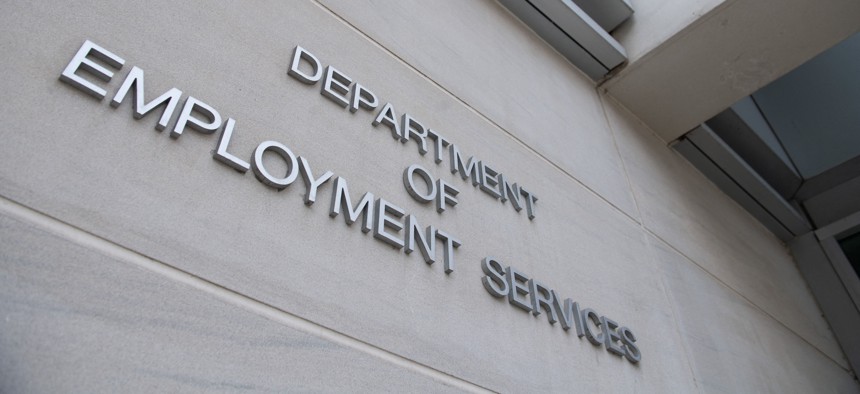The Senate wants states to recover the billions lost to unemployment fraud during the pandemic

States could keep 25% of funds recovered from fraud that occurred during the pandemic. SAUL LOEB/AFP via Getty Images
A bipartisan proposal would let states keep a quarter of the funds they recoup. It is similar to a House proposal passed last year.
The Senate is again trying to incentivize states to recoup billions in unemployment benefits that were improperly paid out during the pandemic.
The top Democrat and Republican on the Senate’s tax committee on Thursday unveiled a bipartisan proposal that would allow states to keep 25% of the payments they are able to recover from fraud that occurred during the pandemic. As it stands now, states can’t keep any of the funds they recoup.
The reclaimed money, according to the proposal, would also provide additional funding to improve antiquated computer systems that have been blamed for enabling the improper payments.
Going forward, states would also be able to keep 5% of the payments made because of overpayment by individuals and another 5% of employer unemployment taxes collected as part of a state investigation.
The framework—negotiated by Democratic Sen. Ron Wyden of Oregon and Republican Sen. Mike Crapo of Idaho—would also create new requirements on states to double-check unemployment applications with other employment databases, such as the Department of Health and Human Services’ National Directory of New Hires.
Most states already take the precaution, said Michele Evermore, a senior fellow at the progressive Century Foundation and former deputy policy director for the Labor Department’s Office of Unemployment Insurance Modernization. But not all do because of the time and effort required.
“This bipartisan framework takes crucial steps toward providing states’ unemployment systems with much-needed tools to recoup and prevent fraudulent claims,” Crapo said in a statement. “By building a stronger and more accessible [unemployment insurance, or UI] system, we can ensure taxpayers are protected and those who need assistance receive it.”
Wyden said the proposal would “make the UI system more resilient so that it’s up to the challenge during the next recession.”
The framework has the support of the White House. In a statement on Thursday, Gene Sperling, senior advisor to the president and American Rescue Plan coordinator, applauded the effort.
“Emergency unemployment benefits were a critical lifeline for millions of workers who lost jobs through no fault of their own during the pandemic. But the implementation in 2020 exposed the need for stronger fraud prevention systems and greater investment in technology to modernize unemployment systems,” he said. “The bipartisan framework released today comprises several specific provisions from the president’s anti-fraud proposal.”
A bill passed by the Republican-led House Ways and Means committee last year also called for letting states keep a quarter of the improper payments they are able to get back.
However, a couple of key differences make it unclear whether House Republicans would go along with the bipartisan Senate framework.
In addition to letting states keep a percentage of the funds they recover, both proposals also increase the statute of limitations on being able to recover payments from five years to 10 years. But while the House bill would do that for both erroneous and fraudulent payments, the Senate bill would only extend the statute of limitations for fraudulent payments.
The difference is significant, Evermore said, because the House’s version would mean those who received overpayments because of errors by the state and through no fault of their own, would for a longer time be held responsible for returning the money. As a result, when there is another recession, people seeking unemployment would have the extra money they received taken out of their benefits. That is not the case under the Senate’s proposal.
“There were so many overpayments because agencies were not sure how to interpret various provisions and, you know, various administrative pieces of this stuff,” Evermore said. “They won't have bills hanging over their heads if suddenly there's an economic downturn. [The Senate framework] is definitely a step in the right direction.”
Last year’s deal to raise the nation’s debt ceiling may have resolved one issue that led to Democratic opposition of the House bill. House Republicans had sought to claw back $400 million in American Rescue Plan Act funding that the Labor Department was sending to states to modernize their systems. However, a deal in June to avert a default on the nation’s debt rescinded half of the $2 billion in ARPA funding to help states pay for modernizing their computer systems and reduce improper payments. The Labor Department in September awarded $377 million of the remaining funds to states, and then gave the remaining money to the National Association of State Workforce Agencies to work with states to improve their systems.
The decision in the 2020 CARES Act to let people self-certify that they were eligible for expanded unemployment benefits and aid to small businesses, made it more difficult for states to prevent fraud, the watchdogs said. But states’ antiquated unemployment computer systems and their failure to share information with each other also fueled the problems.
Gene Dodaro, comptroller general and head of GAO, noted at the hearing that a single Social Security number was used to get unemployment benefits in 29 states.
The Labor Department estimates that 21.5% of the enhanced COVID-19 unemployment benefits Congress approved were improperly paid out. Of the $888 billion in enhanced benefits, about $191 billion in federal dollars were improperly paid by mistake or fraud.
This article was updated on 2/12/24 at 4:05 p.m. to add comment from the White House.
Kery Murakami is a senior reporter for Route Fifty, covering Congress and federal policy. He can be reached at kmurakami@govexec.com. Follow @Kery_Murakami
NEXT STORY: States’ prescription boards tackle high drug costs






